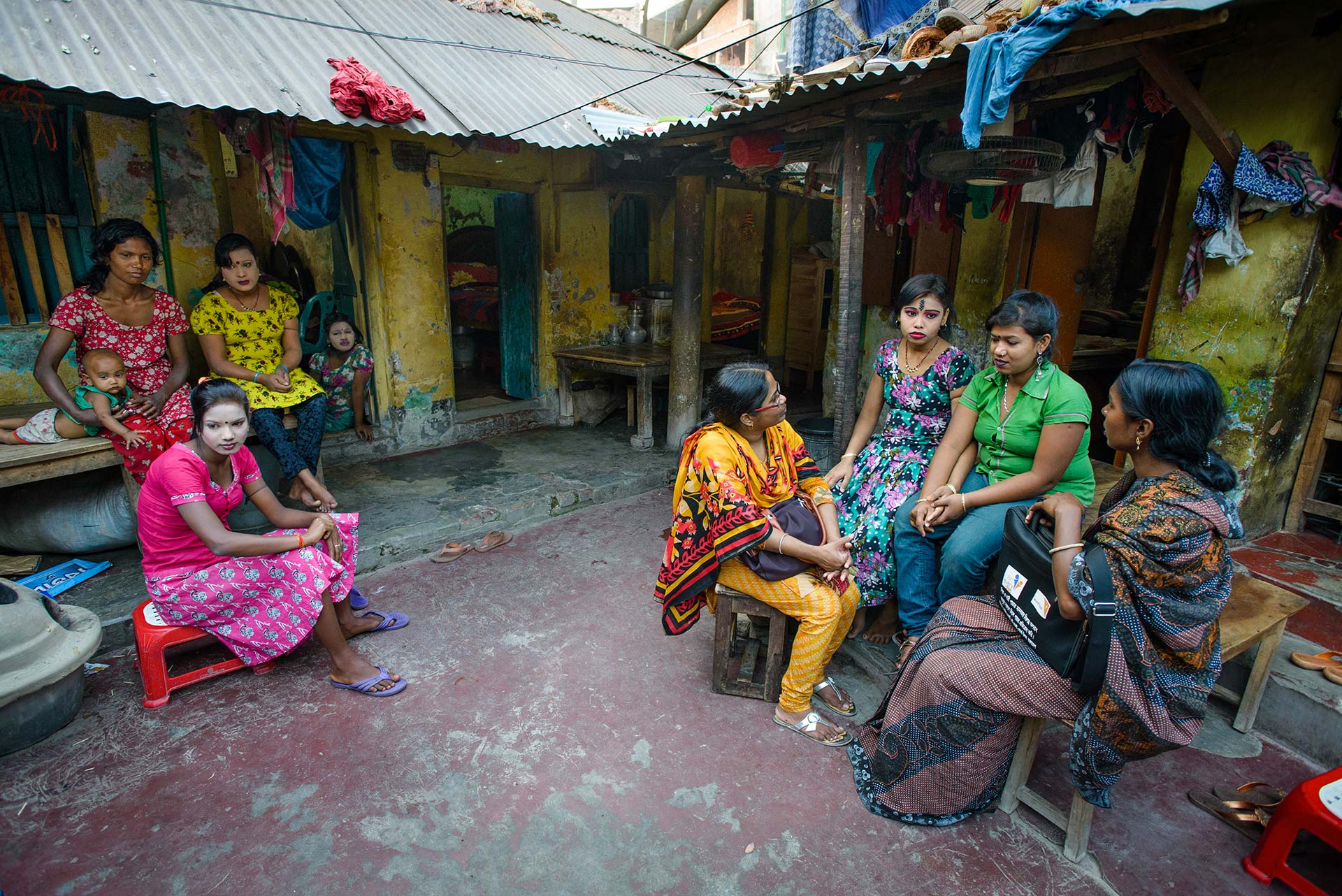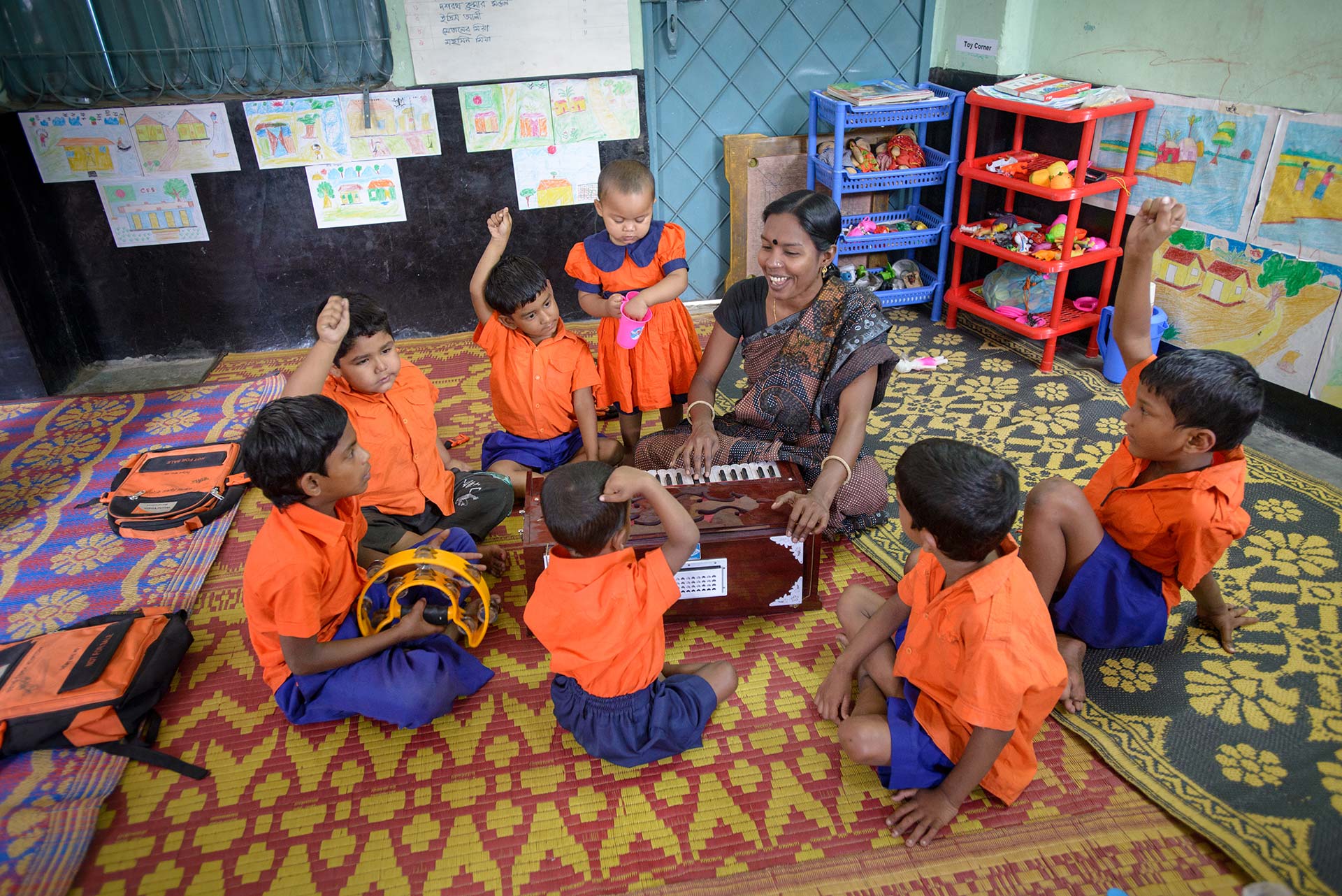In Bangladesh, World Vision provides a refuge for children trapped with their mothers in the sex-trade environment — and weaves a safety net against child trafficking.
Children of the Brothel
By Kari Costanza | Photos By Jon Warren
Tumpa doesn’t know who her father is. She was just seven months along in her mother’s womb when he slithered out of her life. Tumpa’s mother is a prostitute. Her father was a client. He made promises to Tumpa’s mother that he didn’t keep. Now the 3-year-old lives with her mother in a bustling brothel in Jessore, Bangladesh.
A child’s life in a brothel is unimaginable. Tumpa and her mother live with a madam in a giant cement condominium with rooms for sleeping and rooms for sex — sometimes one room serving both purposes. In this place, dozens of women sleep, wake, eat, and conduct soul-scarring business with a steady stream of men as their children look on.
In the open communal space, where brothel workers primp for the next client or consume a hurried lunch of rice and vegetables, Tumpa and the other children fight boredom amid the squalor, playing near stoves leaping with flames, crawling on floors dirty with cigarette butts and empty potato chip wrappers, maybe tossing a rubber ball until a madam screams at them to stop.
The brothel is on Hat Khola Street. In Bengali, hat khola means “the marketplace,” and the street is a vast marketplace indeed. You can buy everything — balls, sugar, tea, biscuits, clothing, screwdrivers, pliers, door hinges, nails. And at the brothel, you can buy people, like Tumpa’s mother.
But just across Hat Khola Street, there is a heavenly respite.
World Vision runs a Child-Friendly Space staffed by Dipshikha Roy, 35. When Tumpa’s mother, Moyna, brings her over each day, the little girl crawls right into Dipshikha’s arms. “Tumpa is so happy here,” Moyna says. “She can play with the other girls.”
“Tumpa is so happy [in the World Vision child-friendly space]. She can play with the other girls.”
Moyna, her mother
Dipshikha begins each day by making sure the children’s uniforms are correctly buttoned, shirts properly tucked, and shoes firmly tied. “We start our session by singing the national anthem,” which the children perform with unbridled joy, Dipshikha says.
“How are your moms?” she asks the children gathered around her in a circle. “Oh, they are still in bed,” says one little boy.
Sojib, whose mother, Jolly, works at the brothel, arrives. “Have you had breakfast? Did you brush your teeth?” Dipshikha asks him. She carefully buttons his orange shirt and helps him climb into his blue shorts, gently smoothing his black hair. Tumpa, who arrived early, stumbles into a table and begins to cry. Dipshikha reaches out to provide instant comfort.
There is constant activity in the Child-Friendly Space, alive with color, sound, and life. “First we count, then we learn letters,” says Dipshikha. “We teach through games. We use posters to teach about fruits and vegetables. We’re now learning to count from 1 to 20.”
After the children’s hot lunch, they are supposed to rest. “It’s actually not rest, it’s running,” she says, laughing.
Every evening, the children return to the brothel and Dipshikha goes home to her daughter, Chitra, 8. Dipshikha’s husband, Binoy, died five years ago, she says, of a hole in his heart. In a sense, Dipshikha now has a hole in her heart as well. “I miss him,” she says.
Chitra, as well as the nine boys and three girls at the Child-Friendly Space, help fill that hole.
Loving Society’s Rejects
Dipshikha is a friend to the women who work at the brothel, such as Tumpa’s mother, Moyna.
“I am happy because World Vision keeps my child all day,” Moyna says. “Dipshikha is a wonderful lady. She treats these children like they are her own.”
Moyna, 30, has been at the brothel for five years. She is from Barisal, east of Jessore on the wide Bangladesh delta plain. She was tricked by a friend into joining the brothel — a common occurrence.
“[My friend] had a job for me, a housecleaning job. I would be able to send money home,” Moyna says, closing her teal-painted eyelids for a moment. “She brought me to the brothel and said, ‘You stay here.’ My friend never came back. I never got a housecleaning job.”
Moyna hates being a sex worker and dreams of becoming a cook. “If I can get a source where I can make money, then I would like to leave this place,” she says. “I want a different life.” Gazing out the window at a wedding ceremony on the street below — a raucous event with loud horns playing — Moyna says she will never marry.
“The workers think they have no future. They don’t think they have a chance. But their children have a future,” says Provash Chandra Biswas, 48, the director for World Vision’s Bangladesh Child Protection Program. A trained attorney, Provash has been with World Vision for two decades, working with those whom society has rejected.
“Most of the children of sex workers are different than normal children. They have stress.”
Provash Chandra Biswas, Director for World Vision’s Bangladesh Child Protection Program
Provash says the madams of the brothel are extremely powerful and that they target the children. “The madam who is running the business, [her] target is the girl child,” he says. “Most of the sex workers, they do not want to bring their children into the profession. But sometimes they have to do that because there are no opportunities.”
It all becomes more frightful at night, says Provash. “You see a lot of criminals. They plan crimes in the brothel. Smugglers also use the brothels.”
Sex workers become prisoners. “If they come out, they face stigma,” says Provash. “What options do they have?”
When Provash visits the brothel to check on the sex workers, he pays keen attention to the children. “They see everything,” he says. “Sometimes they sleep under the beds. The rooms are very small. My observation: Most of the children of sex workers are different than normal children. They have stress.”
Protecting the Vulnerable
Child-Friendly Spaces are part of a comprehensive plan World Vision has implemented in Bangladesh to prevent child trafficking, protect those who might be harmed, and restore those who have suffered. The plan focuses on awareness, advocacy and networking, victim support, and income-generating activities.
World Vision staff meet monthly in Jessore with community members to ensure they are monitoring children. Child protection “point people” are trained to report missing children immediately — setting in motion an Amber Alert-type response.
Staff members work on the border between India and Bangladesh to plug the holes through which people are trafficked, educating law enforcement officers and journalists to recognize what trafficking looks like and to tell the story.
Representatives from World Vision sit on committees at the highest levels of government and engage with the media, developing dramas for television about trafficking.
Through partner organizations, World Vision supports victims with medicine, clothing, testing for disease, and counseling.
And staff train and equip vulnerable families in income-generating activities, such as sewing and raising poultry. Increasing a family’s income lessens the likelihood that the children will be sold.
“In 19 years with World Vision, this is my hardest job,” says Provash. “We do not have any weekends. We do not have any holidays. This is a great challenge for us.”
But it’s a worthwhile challenge for this team of dedicated servants — fighting to stop trafficking, helping restore victims, and protecting children like Tumpa by creating safe, joyful spaces where they can play, learn, and be loved.







